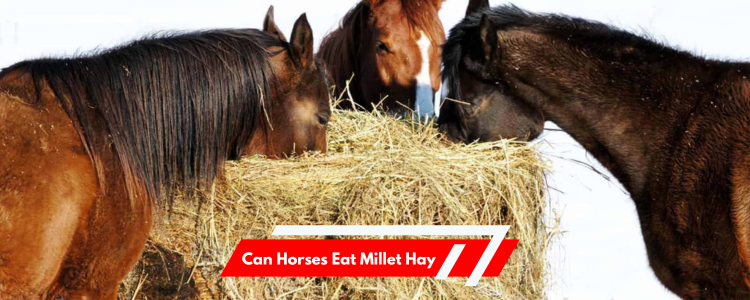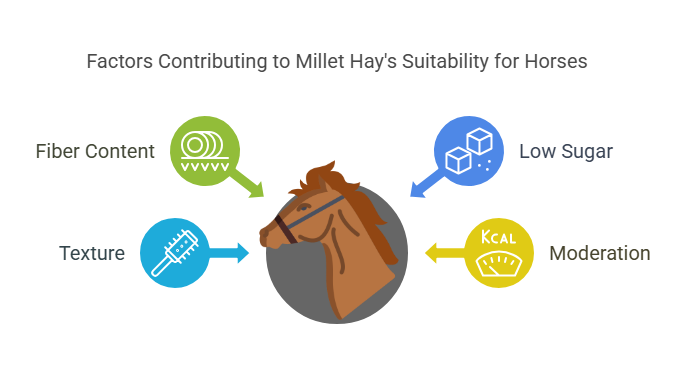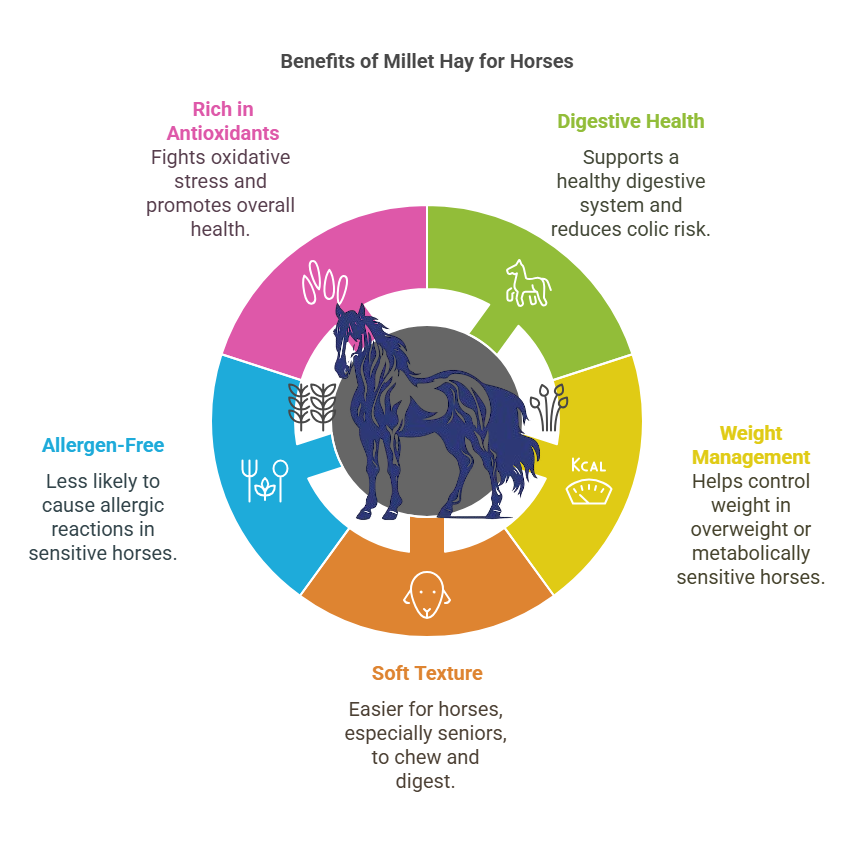Yes, horses can eat millet hay. Horses are herbivores with specific dietary needs. As a horse owner, choosing the right hay is essential for their health. Millet hay is a popular option, but can horses eat millet hay safely? Let’s explore the benefits, risks, and nutritional value of millet hay for horses.
What is Millet Hay?
Millet hay is a type of grass hay made from the millet plant. Millet itself is a small, round seed often used as bird feed. It’s a drought-resistant crop and grows well in a variety of climates. The hay from this plant is typically cut before it matures, providing a soft, palatable option for many animals, including horses.
Millet hay is not as common as other grass hays like timothy or orchard grass, but it has gained popularity in recent years due to its texture and mild taste. It’s known for being rich in fiber and low in sugar, which makes it appealing for horses with certain dietary needs.
Can Horses Eat Millet Hay?
Yes, horses can eat millet hay, and it can be a healthy addition to their diet. However, like any hay, it should be fed in moderation. While millet hay is safe, it is crucial to ensure that it is part of a balanced diet that includes other types of hay and feed.
Millet hay is rich in fiber and low in sugar, making it a good option for horses prone to conditions like obesity or insulin resistance. Its gentle texture also makes it easier for older horses or those with dental issues to chew and digest. However, millet hay lacks some of the nutritional variety found in other types of hay, like alfalfa, which is higher in protein and calcium.
Nutritional Value of Millet Hay
Millet hay offers a range of nutrients beneficial to horses. Here are some key factors:
-
Fiber: Like other grass hays, millet hay is high in fiber. Fiber is essential for a horse’s digestive system. It helps maintain gut health and supports normal bowel movements.
-
Low in Sugar: Millet hay is naturally low in sugar, making it suitable for horses with metabolic disorders, such as equine Cushing’s disease or insulin resistance.
-
Low Protein: Millet hay contains less protein than alfalfa. While this makes it a good choice for adult horses who don’t need extra protein, it might not be ideal for growing foals or high-performance horses who require more protein.
-
Calcium: Millet hay has less calcium than alfalfa hay. While this is suitable for most adult horses, young horses or pregnant mares may need hay with a higher calcium content.
Benefits of Millet Hay for Horses
There are several reasons why millet hay can be a great option for horses:
-
Digestive Health: The high fiber content helps maintain a healthy digestive system, reducing the risk of colic and other gastrointestinal issues.
-
Weight Management: For overweight horses or those prone to metabolic disorders, millet hay offers a lower-sugar alternative to richer hays like alfalfa, making it easier to control their weight.
-
Soft Texture: Millet hay is softer than many other grass hays, which makes it easier for horses, especially senior horses or those with dental issues, to chew and digest.
-
Allergen-Free: Some horses are allergic to certain types of hay, but millet hay is less likely to cause allergic reactions compared to hays like timothy or ryegrass.
-
Rich in Antioxidants: Millet hay contains antioxidants, which help fight oxidative stress and promote overall health.
Risks of Feeding Millet Hay to Horses
While millet hay is generally safe for horses, there are some risks to consider:
-
Lack of Nutritional Variety: Millet hay should not be the only type of hay your horse eats. A lack of variety can lead to nutritional deficiencies. Horses need a balanced diet that includes different hay types to ensure they receive all the essential nutrients.
-
Not Ideal for Young Horses: Because millet hay is low in protein and calcium, it may not be suitable for growing foals or lactating mares, who require higher levels of these nutrients.
-
Possible Digestive Issues: If fed in excessive amounts, millet hay may cause digestive upset in some horses. Always introduce any new hay gradually and monitor your horse’s response.
-
Contamination: As with any hay, it’s important to ensure that the millet hay is free from mold, dust, or contaminants that can cause respiratory or digestive problems. Always store hay in a dry, clean environment.
How Much Millet Hay Should You Feed Your Horse?
The amount of millet hay you should feed depends on your horse’s size, age, and activity level. For most adult horses, 1.5-2% of their body weight in hay should be provided daily. This means that a 1,000-pound horse should eat approximately 15-20 pounds of hay per day.
Millet hay can be fed alongside other types of grass hay. For instance, you might mix millet hay with timothy hay to give your horse a variety of flavors and nutrients. Always provide plenty of fresh water alongside hay to help your horse stay hydrated.
How to Introduce Millet Hay to Your Horse’s Diet
When introducing millet hay to your horse, do so gradually. Horses have sensitive digestive systems, and sudden changes in their diet can lead to colic or other digestive issues. Start by offering a small amount of millet hay alongside your horse’s regular hay. Gradually increase the amount of millet hay over several days until it makes up a larger portion of their diet.
Frequently Asked Questions (FAQs)
1. Can all horses eat millet hay?
Yes, most horses can eat millet hay, but it should be offered as part of a balanced diet. Horses with specific dietary needs, such as foals or lactating mares, may need other types of hay with higher protein or calcium content.
2. Is millet hay better than timothy hay for horses?
Millet hay is softer and lower in sugar, which may make it a better choice for horses with certain health issues. However, timothy hay offers more variety in nutrients, so it is generally better for most horses, especially those that need higher fiber.
3. Can millet hay cause colic in horses?
Colic can occur if a horse eats too much of any one type of hay, including millet hay. Always introduce new foods gradually and monitor your horse’s health closely.
4. Is millet hay suitable for horses with insulin resistance?
Yes, millet hay is low in sugar, making it a good option for horses with insulin resistance or other metabolic disorders.
5. How should millet hay be stored?
Millet hay should be stored in a cool, dry place to prevent mold and contamination. Keep it off the ground and away from moisture to maintain its quality.
Final Thoughts
Millet hay can be a healthy addition to your horse’s diet, offering a variety of benefits, including digestive support, weight management, and a soft texture that’s easy to chew. However, it’s important to feed millet hay in moderation and as part of a balanced diet. If you’re unsure whether millet hay is right for your horse, consult with your veterinarian to ensure you’re meeting all of your horse’s nutritional needs.




